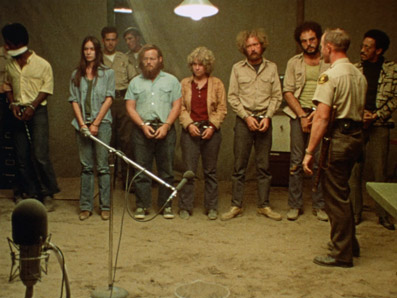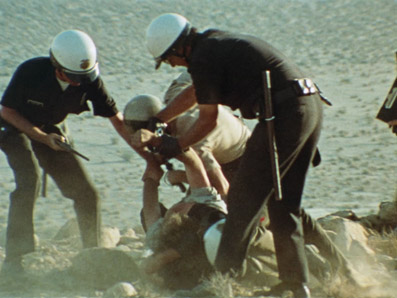| |
"Punishment Park speaks to us as strongly today as it did in 1971 because of its emotional power, because of the strength and accuracy of its metaphorical vision, and because it refuses to supply easy solutions to the problems it so accurately and chillingly depicts. The film was and still is an amazing catalyst for all those who see it, but possible solutions today seem even more difficult and more remote than they did three decades ago." |
| |
Joseph A. Gomez, 2005 |
Amen to that.
It's a fact of art that sooner or later all films will show their age. Their actors grow older, their fashions fade, their technique gives way to new approaches to film storytelling. Even the film stock and lighting can pinpoint a film to a particular era, and part of the critical success of The Artist must surely be down to the painstaking accuracy with which it recreates a long since abandoned cinematic style. For those entranced with the cinema of the here and now at the expense of all else, this can prove a barrier to appreciation of older films and a stick with which to hit them, whether it be for their more stylised performances, more visible effects, or their slower editing pace. Even the most forward-looking films can fall victim to this, though sometimes in a manner that exposes the prejudice of the critic. I remember a retrospective review of Kubrick's masterful 2001: A Space Odyssey (one in a major publication, but I can't recall which) that in the process of trying to knock it off its high critical pedestal mocked the dress sense of its astronauts, being particularly amused by their drainpipe trousers and crew-cut hair. Astronauts with crew-cut hair. Who'd have thought? Elsewhere in the film you'll find a fascinating collision of year-dating elements with visionary thinking when two astronauts pause to sit and watch a current affairs programme in which there are interviewed. The broadcast itself is very much how such a programme must have looked back in 1968, presented as it is by contemporary newsreader Kenneth Kendall in low-resolution monochrome. But they're watching it on iPads, or their IMB equivalent (the screens are actually bigger than the Apple device and the image runs to the edge), flat-screen electronic tablets that were still decades from development.

It's just such a mix of the contemporary and the forward-looking that allows Peter Watkins' brilliant 1971 Punishment Park to retain so much of its power forty years after it was first unleashed. Its participants may well be products of their time, sixties protestors and would-be revolutionaries, but their arguments are as potent and relevant as ever, and the stonewalling they suffer at the hands of the committee that has already decided their guilt and their fate has a disturbingly contemporary ring in the age of Guantanamo Bay and the American National Defence Authorisation Bill. But it's also technically ahead of the game by a good few years, employing a faux-documentary approach that is now very much part of modern film language, from the mockumentary works of Christopher Guest and his contemporaries to the entire 'found footage' horror sub-genre. But rarely has it been used with the sense purpose that Watkins puts it to here.
This was, of course, a signature element of Watkins' cinema, one that led to his 1965 The War Game – a devastating look at the effects of nuclear war on rural England – being banned by the very corporation that commissioned it in the first place, in part due to its shockingly realistic tone. The previous year he even sold the idea of an as-it-happens documentary on the 1746 Battle of Culloden, in which a TV crew interview soldiers and officers in the field without any sense of incongruity. Indeed, I've yet to see a Peter Watkins film I haven't been just a little bit bowled over by – even the uneven Privilege, another work with outdated décor but uncannily accurate future predictions, is an absolute must-see. But if I had to choose a favourite then, in spite of the devastating impact and technical brilliance of The War Game and the exquisite execution of Edvard Munch, Punishment Park would be top of the list.
I've already gone into some detail over why in my review of the previous Masters of Cinema DVD release, which you can read here. Watching it again on this new dual format release, I was astonished how powerfully so much of it still plays, how clearly the anger of Watkins and his performers is communicated, how forward-looking it feels in its themes and technique, and how rare it is to watch a film from this period where as much attention has been paid to the soundtrack as the image.

This new dual format release has the same extra features as the previous DVD, and if you have that edition the decision to upgrade will thus depend largely on...
Punishment Park was shot on 16mm film and blown up to 35mm for theatrical distribution, and the transfer here was made from the 35mm negative. I'm guessing that film was shot on high speed stock, which would allow cinematographers Joan Churchill and Peter Smokler to shoot with only minimal lighting, essential for the realism of the interrogation scenes. A side-effect of this is an increase in grain and a slight softening of definition, at least when compared with standard speed 35mm. But this is completely appropriate for the film's documentary aesthetic, visually aligning it with key works of the Direct Cinema movement that was still very much alive in the early 70s. The transfer on Eureka's previous DVD release was absolutely top notch, so I was intrigued to see how much the Blu-ray would improve on it. As it happens, not that much. This is not a criticism of the new HD transfer, but a testament to the quality of the original DVD image quality and a consequence of restrictions imposed by the original film material. This does mean that everything that was good about the earlier DVD transfer also goes for the Blu-ray, with a good level of detail (at least for high-speed 16mm), very well balanced contrast and little in the way of dust and dirt – as with the previous transfer, a couple of in-camera gate hairs do remain. The colour, though deliberately muted and earthy in tone, is slightly bolder on the Blu-ray than the earlier DVD. Being a 24p transfer, there is also no PAL speedup here.
The linear PCM 96 mono 2.0 track here sounds even richer and more full-bodied than the impressive Dolby mono 2.0 track from the DVD, and really showcases the film's excellent use of sound. Once again the track is clean and boasts a good dynamic range.
This is effectively a dual format re-release of the earlier DVD, and thus has exactly the same extra features, the details of which you'll find on the review of that disc. Really pleased to see the same booklet (with minor adjustments in the credits) included, a densely-packed and essential companion to the film, as is Joseph Gomez's learned commentary. The Peter Watkins introduction, also an excellent inclusion, has been transferred in 1080p.
My favourite film by one of this country's finest yet most marginalised filmmakers, and one I'm happy to label a masterpiece without feeling the need to qualify that statement – the film speaks for itself. If you have the earlier DVD then the decision to upgrade will depend on the size for your TV screen (the bigger it is, the more likely you'll appreciate the HD transfer) and the upscaling quality of your AV setup. If you don't yet own the film or are unhappy with your Blu-ray player's upscaling skills, then this is an absolute must, a brilliant film, impressively transferred and supported by well targeted and detailed extras. For the film, the transfer and the extra features, highly recommended.
|